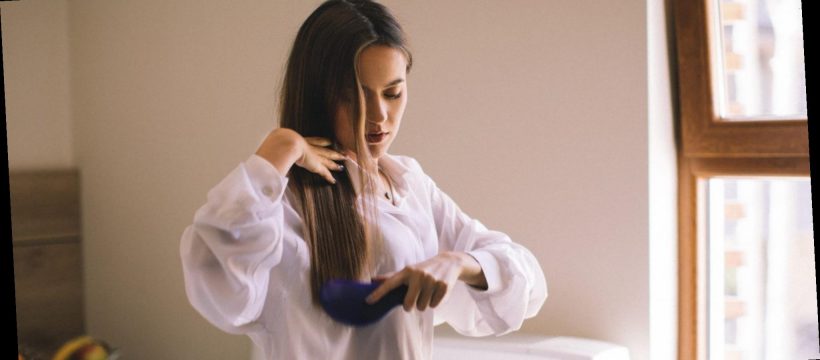A year into the pandemic, we now know that it has not just taken a toll on our mental health, but it's also sped up signs of aging, including hair loss and thinning. Doctors attribute this to heightened levels of the stress hormone cortisol over the past rollercoaster of a year — but hair loss can also be a lingering side-effect of Covid-19 itself.
Back in August, cosmetic dermatologist Michele Green, M.D., told InStyle that she'd seen "a huge increase in hair loss from COVID-19" in her practice — and now we have actual research to back that up. In a recently published paper in the Journal of the Academy of Dermatology, dermatologists looked into the "abrupt uptick in cases of hair shedding" in communities significantly impacted by Covid-19 and found a 400 percent spike this past summer.
Unlike male or female pattern hair loss, which is typically a gradual thinning that occurs due to genetics, the form of hair loss COVID survivors are experiencing is known as telogen effluvium (TE), a more diffuse pattern of hair loss that suddenly and dramatically occurs after an injury, surgery, or illness.
"Most patients have lost over 50% of their hair density and they are experiencing shedding all over the scalp with a widening of their part line," explains New York City-based dermatologist Dendy Engelman, M.D.
Dr. Green adds that the recent COVID-related cases are the most dramatic examples of TE she's treated in her career. "I have never seen this amount of hair loss occur so rapidly and to this extent before in 25 years," she says. "My patients have come in with bags full of hair — enough hair to make a wig — in the most severe hair loss I have ever seen from a viral illness."
Both Dr. Green and Dr. Engelman agree that the high fevers and intense physical symptoms associated with an illness like Covid-19 would be a perfect storm for TE to occur — but if this sudden and dramatic hair loss sounds familiar and you haven't been sick with COVID, psychological stressors could also be at play. "Any acutely stressful event — physical or emotional — can cause hair to cycle from the growing (anagen) or resting (catagen) phase into the falling out (telogen) phase," explains Dr. Engelman. (The authors of the most recent study concluded: "It is unclear if the increase in cases is more closely related to the physiological toll of infection or extreme emotional stress.")
"I have seen people recently with this sudden type of hair loss who also have not been diagnosed with COVID," confirms dermatologist Daniel Belkin, M.D., of the Laser & Skin Surgery Center of New York. "Stressors like prolonged fear, death of a family member, or loss of a job, are all factors that can contribute to hair loss."
Typically, stress or illness-related hair loss occurs anywhere from three to six months after the triggering event, Dr. Engelman says, which is why hair loss first became a hot topic among Covid 'long haulers' this summer. For example, in a poll from July in the Facebook group, Survivor Corps, more than 27% of at least 1,100 poll respondents reported hair loss — despite the CDC not recognizing hair loss as a symptom at the time. (As of November 2020, the health protection includes hair loss as a less-common 'long-term complication'.) A quick search for 'hair loss' in the group shows that complaints of hair shedding — complete with photo receipts — have only picked up since.
The good news is that, while TE can become chronic in rare instances, most cases resolve on their own in time. "It can take four to six months to cycle back to the normal growth phase," Dr. Engelman says. Luckily, many members in the Survivor Corps group report hair regrowth on a similar timeline.
If you are experiencing hair loss due to Covid-19 or stress, all hope is not lost. All derms interviewed for this story recommend the in-office procedure platelet-rich plasma (PRP). "PRP therapy uses injections of a concentration of a patient's own blood platelets to restore and accelerate hair growth," explains dermatologist Sapna Palep, M.D., founder of Spring Street Dermatology in New York City.
"Treatments are done once a month for three months and every six months thereafter for maintenance. It's highly effective — I've undergone PRP Therapy myself for my hair loss," Dr. Palep says.
For the needle-averse or budget-conscious, a hair supplement can also help while you patiently wait for your hair to do its thing. Dr. Engelman and Dr. Green suggest collagen-infused Nutrafol supplements to help stop shedding and start the regrowth process.
Source: Read Full Article

